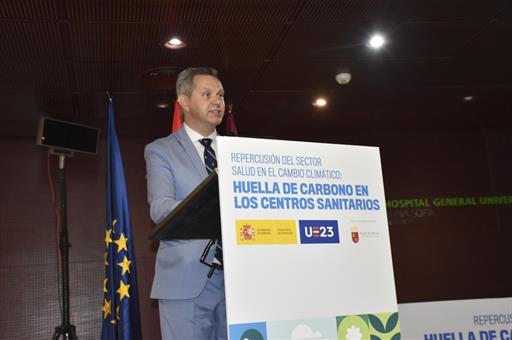Health will develop the first Carbon Footprint Reduction Plan for the health sector in Spain
News - 2023.9.14
The acting Minister for Health, José Miñones, has announced the development of the first Carbon Footprint Reduction Plan in the health sector in our country, with the intention of collaborating to curb the "serious threat to health" posed by climate change.
This was underlined during the opening ceremony of the High Level Meeting (HLM) 'Impact of the health sector on climate change: Carbon footprint in healthcare centres', which was held at the Hospital General Universitario Reina Sofía in Murcia, as part of the healthcare agenda of the Spanish Presidency of the Council of the European Union.
This new plan, explained Miñones, will include a guide of recommendations that will be presented soon and will take as its starting point the study on consumption and emissions in healthcare centres that is being carried out by the Ministry of Health in collaboration with the Autonomous Communities.
A study that will serve to calculate, for the first time in the history of our country, the carbon footprint of the NHS and that will allow us to identify the main sources of greenhouse gas emissions and understand the needs of the National Health System.
All of this, Miñones argued, with the intention that Spain should lead the process of health decarbonisation in Europe, as a priority in the face of climate change, given the role of the health sector as an "active emitter", responsible for approximately 4.4% of net global emissions.
As José Miñones recalled, these initiatives form part of the 2022-2023 Action Programme of the Strategic Plan for Health and Environment (PESMA), "a pioneering roadmap in our country that has already become a reference document at international level".
A plan, he explained, which includes a total of 14 areas with guidelines to make progress in tackling environmental risks through the promotion of healthy environments or the identification of new threats derived from environmental factors, especially among the most vulnerable populations.
Along the same lines, and also within the PESMA, the Spanish Government has recently set up the Health and Climate Change Observatory (OSCC), which will allow it to continue promoting actions that prioritise health and climate action, in coordination with the Ministry for Ecological Transition and the Demographic Challenge.
In short, Miñones pointed out, a broad package of measures that positions Spain as "a benchmark at European level" and which, together with the 'One Health' approach, forms part of the reforms needed to tackle climate change in the health sector.
Achieving the goal of climate neutrality
In this context, the acting Health Minister also defended the need for a broader approach to health in the EU that contributes to the goal of achieving climate neutrality, which is at the top of the EU agenda, as recognised by the European Green Pact.
An approach that includes the new realities associated with climate change and the close relationship between animal health, environmental health and human health.
José Miñones stressed that European climate legislation makes the political ambition to achieve climate neutrality a legal obligation for the EU, an obligation that also applies to the health sector.
"It is our responsibility, both because of our role as an active emitter and because of the large number of measures that we can lead from the health field," he remarked.
The event was also attended by Juan José Pedreño, Regional Minister for Health of the Region of Murcia; the Director of the Department of Public Health and Environment of the World Health Organisation (WHO), María Neira; the Government Delegate in the Region of Murcia, Francisco Jiménez; the Undersecretary for Ecological Transition and the Demographic Challenge, Miguel Ángel González Suela; the Director of the National Institute of Health Management (INGESA), Belén Hernando; the Director General of Public Health, Pilar Aparicio; and the Undersecretary of the Ministry of Health, Octavio Rivera Atienza.
Non official translation





